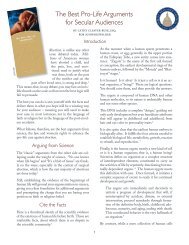The Effects of Divorce on Children - Family Research Council
The Effects of Divorce on Children - Family Research Council
The Effects of Divorce on Children - Family Research Council
You also want an ePaper? Increase the reach of your titles
YUMPU automatically turns print PDFs into web optimized ePapers that Google loves.
tends to affect the relati<strong>on</strong>ship <str<strong>on</strong>g>of</str<strong>on</strong>g> the child and the opposite-sex parent more<br />
than the child and their parent <str<strong>on</strong>g>of</str<strong>on</strong>g> the same sex. 38<br />
% Rating Dad Warm and Loving<br />
45.0%<br />
40.0%<br />
35.0%<br />
30.0%<br />
25.0%<br />
20.0%<br />
15.0%<br />
10.0%<br />
5.0%<br />
0.0%<br />
41.2%<br />
Father Rated Warm and Loving<br />
25.8%<br />
Source: Nati<strong>on</strong>al L<strong>on</strong>gitudinal Survey <str<strong>on</strong>g>of</str<strong>on</strong>g> Adolescent Health Wave 2, 1996<br />
14.6%<br />
6.3%<br />
3.3%<br />
Intact Step Cohabit <str<strong>on</strong>g>Divorce</str<strong>on</strong>g>d Single<br />
<str<strong>on</strong>g>Divorce</str<strong>on</strong>g>d fathers, especially n<strong>on</strong>-custodial fathers, do not fare well with their<br />
children. <strong>Children</strong> report more distant relati<strong>on</strong>ships with their fathers, 39 and<br />
fathers report “a more negative change in their relati<strong>on</strong>ships with their children<br />
than [do] custodial mothers.” 40 <str<strong>on</strong>g>The</str<strong>on</strong>g> pattern <str<strong>on</strong>g>of</str<strong>on</strong>g> worsening relati<strong>on</strong>ships after the<br />
breakup holds for both s<strong>on</strong>s 41 and daughters, 42 and more c<strong>on</strong>flict during the<br />
divorce process increases the likelihood <str<strong>on</strong>g>of</str<strong>on</strong>g> distance between the father and his<br />
children. 43 However, as time passes after the breakup, c<strong>on</strong>flict between father and<br />
child decreases. Additi<strong>on</strong>ally, older children typically experience less c<strong>on</strong>flict with<br />
their n<strong>on</strong>resident fathers than do younger children. 44<br />
38 Alan Booth and Paul R. Amato, “Parental Marital Quality, Parental <str<strong>on</strong>g>Divorce</str<strong>on</strong>g>, and Relati<strong>on</strong>s<br />
with Parents,” Journal <str<strong>on</strong>g>of</str<strong>on</strong>g> Marriage and the <strong>Family</strong> 56, no. 1 (1994): 28.<br />
39 Rosemary Dunlop, Ailsa Burns, and Suzanne Bermingham, “Parent-Child Relati<strong>on</strong>s and<br />
Adolescent Self-Image Following <str<strong>on</strong>g>Divorce</str<strong>on</strong>g>: A Ten Year Study,” Journal <str<strong>on</strong>g>of</str<strong>on</strong>g> Youth and<br />
Adolescence 30 (2001): 117-134.<br />
40 Marsha Kline Pruett, Tamra Y. Williams, Glendessa Insabella, and Todd D. Little, “<strong>Family</strong><br />
and Legal Indicators <str<strong>on</strong>g>of</str<strong>on</strong>g> Child Adjustment to <str<strong>on</strong>g>Divorce</str<strong>on</strong>g> Am<strong>on</strong>g Families With Young <strong>Children</strong>,”<br />
Journal <str<strong>on</strong>g>of</str<strong>on</strong>g> <strong>Family</strong> Psychology 17, no. 2 (2003): 174.<br />
41 Nicholas Zill, D<strong>on</strong>na Morris<strong>on</strong>, and Mary Jo Coiro, “L<strong>on</strong>g Term <str<strong>on</strong>g>Effects</str<strong>on</strong>g> <str<strong>on</strong>g>of</str<strong>on</strong>g> Parental <str<strong>on</strong>g>Divorce</str<strong>on</strong>g> <strong>on</strong><br />
Parent-child Relati<strong>on</strong>ships, Adjustment, and Achievement in Young Adulthood,” Journal <str<strong>on</strong>g>of</str<strong>on</strong>g><br />
<strong>Family</strong> Psychology 7 (1993): 91-103.<br />
42 C<strong>on</strong>stance R. Ahr<strong>on</strong>s and Jennifer L. Tanner, “Adult <strong>Children</strong> and <str<strong>on</strong>g>The</str<strong>on</strong>g>ir Fathers: Relati<strong>on</strong>ship<br />
Changes Twenty Years after Parental <str<strong>on</strong>g>Divorce</str<strong>on</strong>g>,” <strong>Family</strong> Relati<strong>on</strong>s 52 (2003): 340-351.<br />
43 Janet Johnst<strong>on</strong>, “High C<strong>on</strong>flict <str<strong>on</strong>g>Divorce</str<strong>on</strong>g>,” <str<strong>on</strong>g>The</str<strong>on</strong>g> Future <str<strong>on</strong>g>of</str<strong>on</strong>g> <strong>Children</strong> (1994): 165-182.<br />
44 Judy Dunn, Helen Cheng, Thomas G. O’C<strong>on</strong>nor, and Laura Bridges, “<strong>Children</strong>’s Perspectives<br />
<strong>on</strong> <str<strong>on</strong>g>The</str<strong>on</strong>g>ir Relati<strong>on</strong>ships with <str<strong>on</strong>g>The</str<strong>on</strong>g>ir N<strong>on</strong>resident Fathers: Influences, Outcomes and<br />
Implicati<strong>on</strong>s,” Journal <str<strong>on</strong>g>of</str<strong>on</strong>g> Child Psychology and Psychiatry 45, no. 3 (2004): 559.<br />
7




